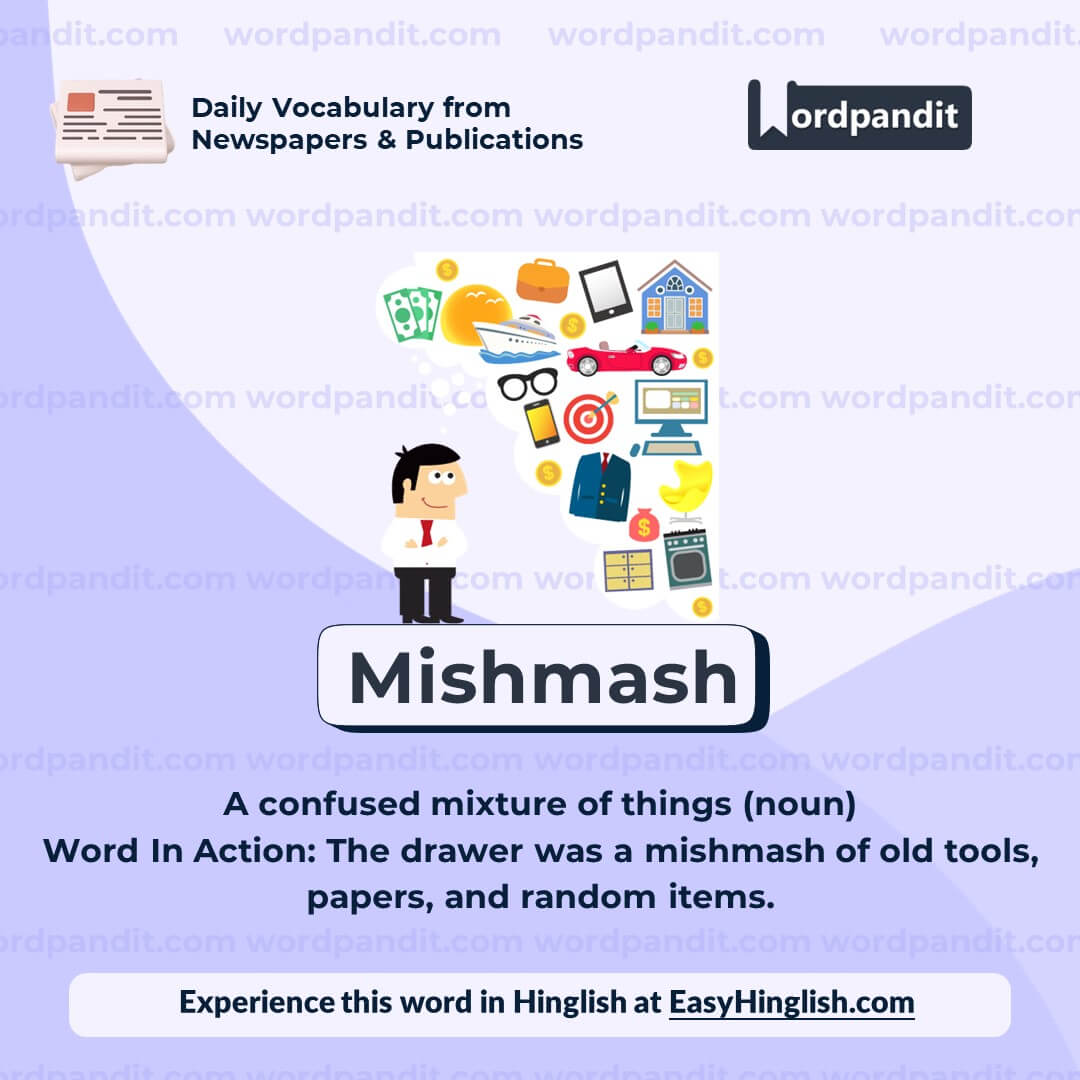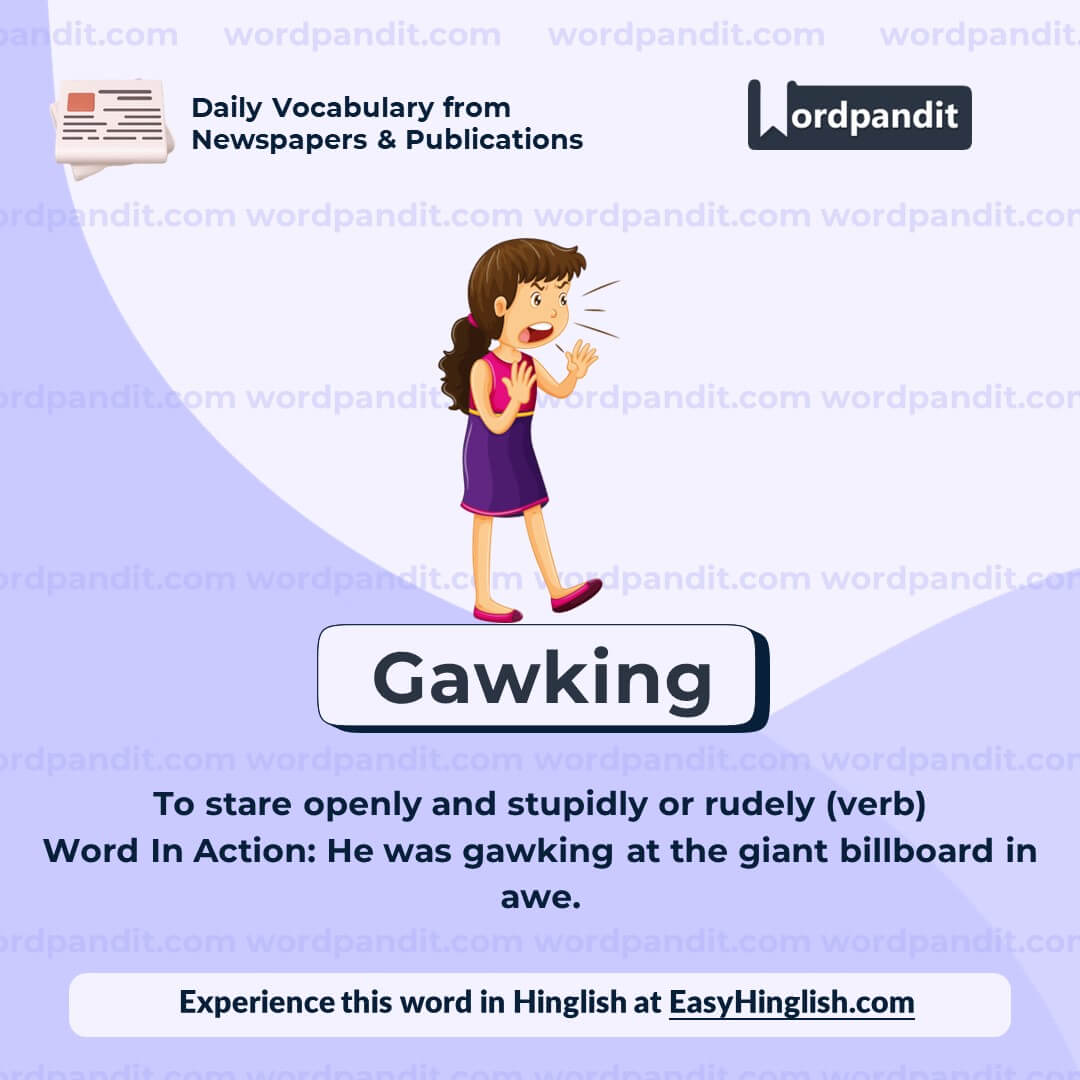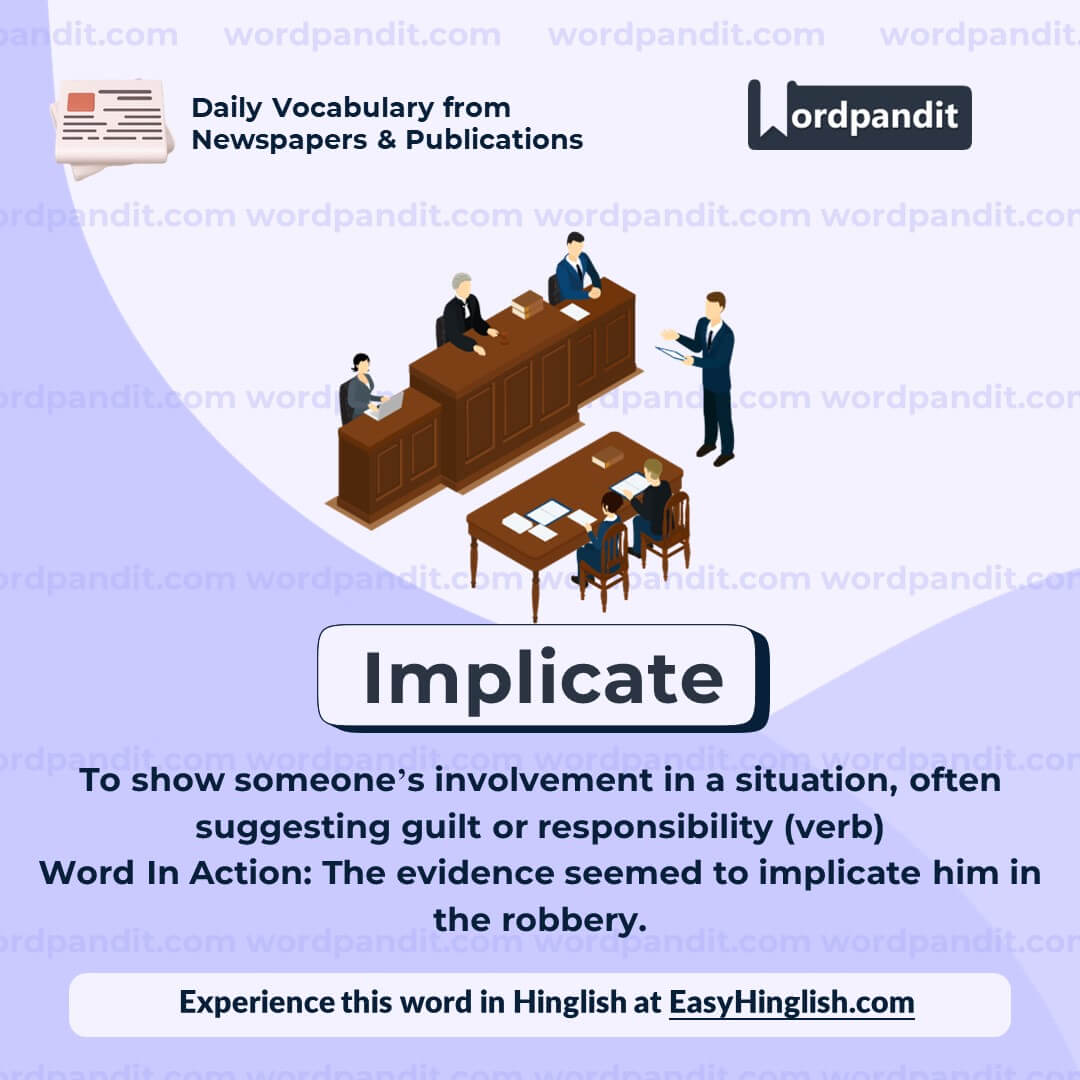Daily Vocabulary from International Newspapers and Publications
Expand Your Vocabulary with Wordpandit’s Global Vocabulary Hub
At Wordpandit, we are committed to helping you develop a truly global vocabulary by drawing from some of the most respected international publications. This section is designed to keep you ahead of the curve by introducing you to words that define global conversations and trends.
The Power of Global Sources
To help you think and communicate on a global scale, we curate vocabulary from renowned international sources, such as:
- The New York Times
- The Washington Post
- BBC
- The Guardian
- The Economist
- Scientific American
- Psychology Today
- And many more...
Stay Global, Stay Competitive
Our daily updates from international publications ensure you are consistently exposed to new words that reflect global news and developments, making sure your vocabulary is not only current but also globally relevant.
Enhance Your Global Perspective
Whether you’re preparing for international exams, aiming to excel in global business communication, or want to enhance your language skills for personal growth, Wordpandit offers the resources you need to thrive in a global context.
Effective Learning, Global Reach
Our learning methodology combines global examples, memory aids, and interactive activities, allowing you to internalize new words effectively and apply them in real-world scenarios.
Begin Your Global Vocabulary Journey Now!
Why Choose Wordpandit?
Practical Learning: Focus on words you'll actually encounter in real-world reading, enhancing your comprehension and communication skills.
Diverse Content: From current affairs to scientific breakthroughs, our varied sources expose you to vocabulary across multiple domains.
Effortless Integration: Make Wordpandit a part of your daily routine. Just a few minutes each day can significantly boost your lexicon over time.
Your Path to Vocabulary Mastery
- Visit our Daily Vocabulary section regularly
- Explore new words and their usage in context
- Practice incorporating these words into your own writing and speech
- Track your progress as your vocabulary expands
Start Your Journey Today
Embark on your vocabulary enhancement journey with Wordpandit. By consistently engaging with our daily posts, you'll build a robust vocabulary that serves you well in academic, professional, and personal contexts.
Remember, a word a day keeps linguistic limitations at bay. Make Wordpandit your daily companion in the quest for vocabulary excellence!
WORD-1: Decontextualized
Context:
"One could almost believe Scott was writing specifically about US foreign policy in the counterterrorism age, making his case against the imposition of grand, decontextualised, ahistorical social engineering projects that discounted those for whom the plans were ostensibly drawn – the people." - Aeon
Explanatory Paragraph:
The word "decontextualized" refers to something that has been removed from its original context, environment, or setting, leading to a potential loss of meaning or relevance. It often highlights the disconnection between ideas, actions, or objects and their natural, historical, or cultural background. For instance, ideas or policies may become less effective or misunderstood when applied without consideration of their original context.
Meaning: To remove something from its context, often causing a loss of meaning or clarity (verb/adjective).
Pronunciation: dee-kawn-TEKS-choo-uh-lized
Difficulty Level: ⭐⭐⭐ Intermediate
Etymology: Derived from "de-" (meaning removal) and "contextualize," which stems from "context" (Latin: "contextus," meaning to weave together).
Synonyms & Antonyms:
Synonyms: Isolated, detached, disassociated
Antonyms: Contextualized, connected, integrated
Usage Examples:
- The study decontextualized the data, which made the findings less applicable to real-world scenarios.
- Artworks displayed in galleries can often feel decontextualized from the culture and history they represent.
- His argument became weak when he decontextualized the historical events from their social environment.
- The teacher warned against decontextualizing quotes from literary texts during analysis.
Cultural Reference:
"Decontextualization" is a common critique in postmodern literature, where authors and scholars argue that taking concepts, stories, or cultural artifacts out of their original setting diminishes their meaning or impact. For example, the removal of indigenous art from its cultural setting to be displayed in a museum often sparks debates about decontextualization. - General Knowledge
Think About It:
How does removing the context of a historical event or cultural artifact affect our understanding of it? Can decontextualization ever be beneficial?
Quick Activity:
Find a quote or excerpt from a famous text and analyze how its meaning changes when removed from its original context.
Memory Tip:
Think of "decontextualized" as "de-" (removal) + "context" (the setting or background). Picture an object floating in space without its background to remember the meaning.
Real-World Application:
Understanding the concept of "decontextualized" is essential in academic research, media studies, and policymaking, where arguments and decisions often rely on the accurate context of information. It also has implications in cross-cultural communication, where decontextualized ideas may lead to misunderstandings.
WORD-2: Mishmash
Context:
"One could almost believe Scott was writing specifically about US foreign policy in the counterterrorism age, making his case against the imposition of grand, decontextualised, ahistorical social engineering projects that discounted those for whom the plans were ostensibly drawn – the people." - Aeon
Explanatory Paragraph:
The word "mishmash" refers to a disorganized mixture of things, often implying a lack of coherence or structure. It is typically used to describe a collection of unrelated or poorly integrated ideas, items, or concepts that seem jumbled together. For instance, a presentation with scattered themes and inconsistent points could be described as a "mishmash."
Meaning: A confused mixture of things (noun).
Pronunciation: MISH-mash
Difficulty Level: ⭐⭐ Beginner
Etymology: Originating from Middle English, likely an alteration of "mash," meaning a mix or crush, and influenced by the repetitive nature of the term for emphasis.
Synonyms & Antonyms:
Synonyms: Hodgepodge, jumble, medley, clutter
Antonyms: Order, organization, system, structure
Usage Examples:
- The essay was a mishmash of ideas that lacked a clear argument or direction.
- Her wardrobe was a mishmash of styles, with no consistent theme or pattern.
- The new policy is just a mishmash of old rules pieced together without any real innovation.
- The party decorations turned out to be a mishmash of mismatched colors and themes.
Cultural Reference:
The term "mishmash" is often used in pop culture to describe chaotic creative works. For example, many movie critics describe poorly edited or incoherent films as a "mishmash of genres" when they lack a consistent tone or storyline. - General Knowledge
Think About It:
In what ways can a mishmash of ideas or elements sometimes lead to creativity, rather than just disorganization?
Quick Activity:
Take five unrelated objects or ideas around you and try to combine them into a coherent story or concept. Reflect on how challenging it is to avoid creating a "mishmash."
Memory Tip:
Visualize "mishmash" as two identical syllables mashed together in a chaotic way—just like its meaning of a disorganized mix!
Real-World Application:
In the real world, "mishmash" is often used to describe disorganized situations, such as chaotic meetings, cluttered homes, or poorly planned events. Learning to recognize and simplify a mishmash of elements is a valuable skill in project management and problem-solving.
WORD-3: Gawking
Context:
"And, in the process of gawking at the surreal spectacle all over again, viewers may even find themselves a tad implicated in the systems of ‘news coverage’." - Aeon
Explanatory Paragraph:
The word "gawking" refers to staring openly and often rudely, usually in a way that suggests amazement, curiosity, or disbelief. It is often associated with behavior that lacks discretion or tact, such as stopping to stare at something unusual or surprising in public. For example, people might gawk at a famous celebrity walking down the street or at a dramatic car accident.
Meaning: To stare openly and stupidly or rudely (verb).
Pronunciation: GAW-king
Difficulty Level: ⭐ Beginner
Etymology: Derived from the Middle English word "gawk," meaning to stare foolishly, and possibly related to the Old Norse word "ga," meaning to heed or observe.
Synonyms & Antonyms:
Synonyms: Stare, gape, ogle, peer
Antonyms: Glance, avert, ignore, overlook
Usage Examples:
- The tourists couldn’t stop gawking at the towering skyscrapers of New York City.
- He was gawking at the luxury cars in the showroom, completely mesmerized by their design.
- Stop gawking and start walking, or you’ll miss the next bus!
- The children stood gawking at the magician’s tricks, their eyes wide with wonder.
Cultural Reference:
In many films and shows, "gawking" is portrayed as a comedic or awkward moment. For example, characters in sitcoms often gawk at something ridiculous or shocking, highlighting their disbelief or amazement for humorous effect. - General Knowledge
Think About It:
Why do people tend to gawk at unusual events or spectacles? Does this behavior stem more from curiosity or a lack of self-awareness?
Quick Activity:
Imagine you are walking past something surprising, such as a street performer or an exotic animal. Write a sentence describing how you might gawk at the scene, using descriptive language.
Memory Tip:
Associate "gawking" with the wide-eyed, open-mouthed expression people often have when staring at something surprising or unusual. Picture someone frozen in disbelief!
Real-World Application:
The word "gawking" is commonly used in casual conversation and writing to describe moments of curiosity or inappropriate staring. It is especially relevant in urban settings, where unusual sights often draw gawkers, or in social settings where staring may be considered impolite.
WORD-4: Implicate
Context:
"And, in the process of gawking at the surreal spectacle all over again, viewers may even find themselves a tad implicated in the systems of ‘news coverage’." - Aeon
Explanatory Paragraph:
The word "implicate" means to show or suggest that someone is involved in something, often in a negative or harmful way, such as a crime, wrongdoing, or a questionable situation. It can also mean to convey a connection or involvement in a broader system or context. For example, being "implicated" in a system implies a role or participation, whether intentional or not, in its functioning.
Meaning: To show someone’s involvement in a situation, often suggesting guilt or responsibility (verb).
Pronunciation: IM-pli-kayt
Difficulty Level: ⭐⭐⭐ Intermediate
Etymology: From Latin "implicare," meaning "to entangle or involve," formed by combining "in-" (in) and "plicare" (to fold).
Synonyms & Antonyms:
Synonyms: Involve, entangle, associate, connect
Antonyms: Exonerate, absolve, detach, disconnect
Usage Examples:
- The investigation implicated several high-ranking officials in the scandal.
- Her actions were implicated in the broader issue of workplace inequality.
- He was careful not to say anything that might implicate him in the theft.
- The evidence seems to implicate the company in the environmental disaster.
Cultural Reference:
The concept of "implication" is frequently explored in literature and media, such as in detective novels and legal dramas. For instance, in crime thrillers, the protagonist often works to prove that they were falsely implicated in a crime, adding tension and drama to the plot. - General Knowledge
Think About It:
In what ways can people be implicated in systems or structures without being fully aware of their role? Can someone be responsible for an outcome if their involvement is unintentional?
Quick Activity:
Write a sentence where someone is implicated in an event or situation. Try to show how their involvement might not be entirely clear or intentional.
Memory Tip:
Remember "implicate" by thinking of the root "plic," which means "to fold." Imagine someone’s actions folded into a situation, making them part of it, whether they want to be or not.
Real-World Application:
The word "implicate" is essential in discussions about ethics, law, and responsibility. It’s used to describe how individuals or groups may be tied to larger issues, such as social injustices, corporate actions, or systemic problems. Recognizing how people can be implicated is key to understanding accountability in modern society.
WORD-5: Sublime
Context:
"Laboratories of the impossible: By testing the boundaries of reality, Spanish-language authors have created a sublime counterpart to experimental physics." - Aeon
Explanatory Paragraph:
The word "sublime" describes something that is of such excellence, grandeur, or beauty that it inspires awe or deep admiration. It often refers to experiences, objects, or works that transcend the ordinary and evoke profound emotions. In literature, art, and philosophy, the sublime is used to describe moments or creations that are extraordinary and almost otherworldly in their impact.
Meaning: Of such excellence, grandeur, or beauty as to inspire awe (adjective).
Pronunciation: suh-BLYME
Difficulty Level: ⭐⭐⭐ Intermediate
Etymology: From Latin "sublimis," meaning "high or lofty," composed of "sub-" (up to) and "limen" (threshold).
Synonyms & Antonyms:
Synonyms: Exalted, majestic, transcendent, awe-inspiring
Antonyms: Ordinary, mediocre, mundane, inferior
Usage Examples:
- The view from the mountaintop was absolutely sublime, leaving everyone speechless.
- Her performance in the play was sublime, earning her a standing ovation.
- The poet captured the sublime beauty of nature in his verses.
- Listening to the orchestra's symphony was a sublime experience that moved the audience to tears.
Cultural Reference:
The concept of the "sublime" has been explored extensively in art and philosophy. In the 18th century, philosopher Edmund Burke wrote about the sublime as a quality that evokes both awe and terror, often inspired by vastness, power, or beauty in nature, such as a stormy sea or towering mountains. - General Knowledge
Think About It:
What is it about experiences or objects that makes them sublime? Can something ordinary become sublime through a shift in perspective?
Quick Activity:
Think of a moment in your life when you experienced something sublime—perhaps a breathtaking view, a powerful piece of music, or an awe-inspiring event. Write a short paragraph describing the experience.
Memory Tip:
Think of "sublime" as something so "lofty" or "high" in quality that it elevates your thoughts and feelings beyond the ordinary.
Real-World Application:
The word "sublime" is used in art, literature, and everyday life to describe extraordinary experiences or creations. For example, a beautifully written novel, a stunning landscape, or a remarkable act of kindness can all be described as sublime. Recognizing the sublime helps us appreciate beauty and excellence in the world around us.


















